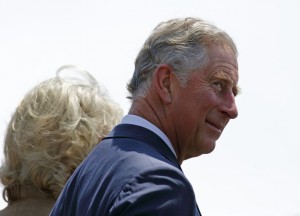Rules Are for Schmucks: Beware the Power of the “Defender of Faith”
 Photo by jamieroach / 123RF
Photo by jamieroach / 123RF Several decades ago, when my sister seemed to be slipping off the golden path to graduating from college, I made her a promise: “If you graduate I’ll give you a trip to England to see Prince Charles’s coronation as king, whenever that occurs.”
Good news: my sister graduated, and Queen Elizabeth has hung on, and on, and on, so I haven’t yet had to pay up on my promise.
Bad news: Charles, who at the time the promise was made was young, dashing, and extremely single, has lost his heartthrob status. Worse yet, he now seems intent on using religion to try to make himself relevant, bashing nonbelievers along the way.
Last week Charles used the status he earned by virtue of being born to address the British Parliament and present it with a report entitled Religious Freedom in the World – 2014. It sounds like something that might have been prepared by the United Nations or some other neutral agency, but it wasn’t. It was prepared by a Vatican lobbying outfit called “Aid to the Church in Need,” which operates “under the guidance of the Holy Father.”
Not surprisingly, the report concludes that Christianity is the most persecuted religion on the planet. Perhaps so. But nowhere in the entire thirty-two-page executive summary of the report is there the slightest indication of any lack of freedom on the part of the billion or so humans who profess no religion, or the grave risk to their lives they would run in many places by coming out of the closet. In fact, the only references to nonbelievers in the report portray us as the enemy. The foreword bemoans “a trend toward religious indifference and atheism,” and the “Main Findings” section concludes that “in Western countries, religious tension is rising, provoked by the recent phenomena of ‘aggressive atheism’ [and] liberal secularism.”
It’s no surprise, therefore, that Charles says he wants to change one of his royal titles if he ever becomes king from “Defender of the Faith” (a title first conferred by the pope on Charles’s predecessor, Henry VIII, before Henry betrayed him) to a more generic “Defender of Faith.” From whom does Charles propose to defend faith? The answer seems to be from us—the people who have given up blind allegiance to God experts and chosen to think for ourselves. Who else besides us is attacking faith, so that it requires defending?
According to Charles, “our future as a free society—both here in Britain and throughout the world—depends on recognizing the crucial role played by people of faith.” The rest of us, apparently, constitute the threat to “our future as a free society” that needs to be defended against.
When Kurt Westergaard’s life was threatened for publishing a cartoon that some Muslims didn’t like, Charles jumped squarely on the anti-freedom bandwagon, traveling all the way to al-Azhar University to opine that “the recent ghastly strife and anger over the Danish cartoons shows the danger that comes of our failure to listen and to respect what is precious and sacred to others. In my view, the true mark of a civilized society is the respect it pays to minorities and to strangers.” Some of us think the true mark of a civilized society is not having people attacked in their homes with axes for drawing a cartoon.
Ironically, the very week that Charles delivered the Vatican’s complaints, the people of Britain chimed in with a rather contrary point of view. A majority of Britons on a Huffington Post survey concluded that religion “does more harm than good,” and 60 percent described themselves as “not religious at all.” Another recent survey showed that twice as many Britons believe in ghosts as believe in God. Perhaps Charles could become the “Defender of Ghosts”? The whole point of being a king, though, is that you don’t have to care what your subjects think. That’s why we decided to ditch Charles’s great-great-great-great-great-grandfather on this side of the pond back in 1776.
Charles’s anti-democratic thinking, though, is reflected in another more troublesome story from Britain last week. Unlike the United States, the British taxpayer-financed education system is riddled with what are called “faith schools,” where the teaching of religion is required. In what seemed at first like it would be a step forward, the authorities recently announced that students would have to be given instruction in at least two different religions, rather than only in one. Some Christian, Jewish, and Muslim educators are bitterly opposed to that. They view their whole raison d’etre as brainwashing future contributors to their coffers, and the mere suggestion that children be told that there might be a different way of looking at things is unthinkable. They can take some solace, though, that their most robust competitor—humanism—is now officially excluded from the game. The whole vast body of nontheistic ethical thought, from Socrates through Spinoza through Stanton and the leaders of today like Barbara G. Walker is off the table. Schools will not be able to comply with the new rule by teaching Islam and humanism, or Catholicism and humanism, or Hinduism and humanism, even though humanism (whether or not it’s called that) seems to be the most common life stance in Britain today. Only study of the magic supernatural qualifies under the new curriculum.
Letting children know that it’s possible to be “good without a god” would make Charles’s chosen role as Defender of Faith much more difficult, don’t you think?
